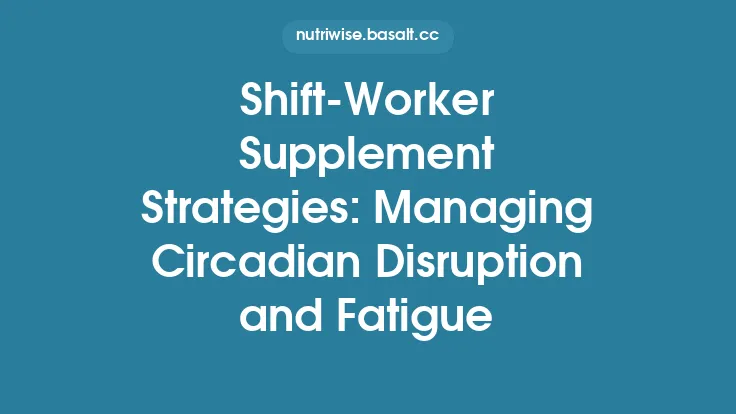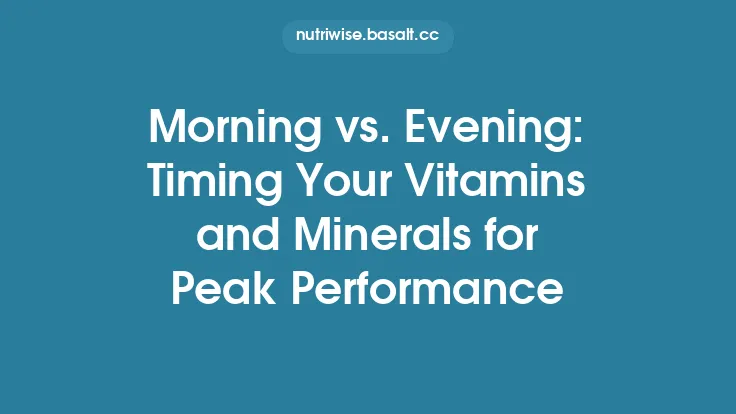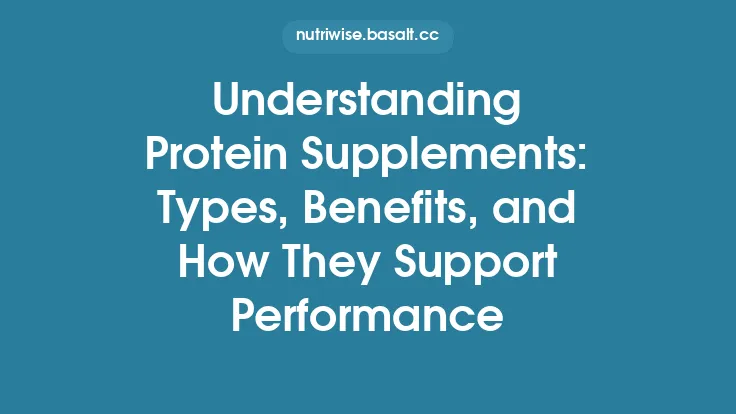College life is a whirlwind of lectures, labs, group projects, extracurriculars, and social events. The academic calendar often demands long study sessions, early‑morning classes, and late‑night assignments, all of which can tax the nervous system, deplete nutrient stores, and challenge mental clarity. While a balanced diet, adequate sleep, and effective time‑management are the foundations of optimal performance, many students turn to dietary supplements to fill gaps, buffer stress, and sharpen focus. Below is a comprehensive, evidence‑based guide to the supplements that have the strongest research support for stress management and cognitive performance in the college‑aged population (typically 18‑25 years). The recommendations are framed as “essentials” – meaning they are generally safe, widely available, and can be incorporated into a typical student routine without requiring specialized medical supervision. As always, individuals with underlying health conditions or those taking prescription medications should consult a healthcare professional before beginning any new supplement regimen.
Understanding the College Student Lifestyle
| Common Stressors | Typical Nutrient Challenges |
|---|---|
| Academic pressure and exam anxiety | Low intake of omega‑3 fatty acids (due to limited fish consumption) |
| Irregular sleep patterns (all‑nighters) | Suboptimal B‑vitamin status from fast food or skipped meals |
| Caffeine overuse (energy drinks, coffee) | Magnesium depletion from high stress and alcohol |
| Social and financial worries | Vitamin D insufficiency from indoor study environments |
| Limited time for meal preparation | Inadequate fiber and probiotic intake |
These stressors often create a feedback loop: poor sleep and nutrition increase cortisol levels, which in turn impair memory consolidation and executive function. Targeted supplementation can help break this cycle by supporting neurotransmitter synthesis, reducing oxidative stress, and stabilizing mood.
Key Nutrients for Stress Resilience
1. Magnesium (Mg) – The “Calm” Mineral
- Why it matters: Magnesium acts as a natural calcium antagonist in neurons, helping to regulate NMDA receptor activity and prevent excitotoxicity. It also modulates the hypothalamic‑pituitary‑adrenal (HPA) axis, dampening cortisol spikes.
- Effective forms: Magnesium glycinate, magnesium threonate, and magnesium citrate have high bioavailability. Threonate is especially noted for crossing the blood‑brain barrier.
- Suggested dose: 200–400 mg elemental magnesium per day, divided into two doses (morning and evening) to avoid gastrointestinal upset.
- Evidence snapshot: A 2017 meta‑analysis of 18 randomized controlled trials (RCTs) found that magnesium supplementation reduced subjective anxiety scores by an average of 0.5 SD (standard deviations) compared with placebo.
2. Vitamin D (Calciferol) – Mood and Immune Support
- Why it matters: Vitamin D receptors are abundant in brain regions involved in mood regulation (e.g., prefrontal cortex). Deficiency correlates with higher rates of depressive symptoms and impaired cognition.
- Effective forms: Vitamin D3 (cholecalciferol) is preferred over D2 for its longer half‑life.
- Suggested dose: 1,000–2,000 IU daily for most students; higher doses (up to 4,000 IU) may be needed for those with documented deficiency (serum 25‑OH‑D <20 ng/mL).
- Evidence snapshot: A 2020 systematic review reported that vitamin D supplementation improved mood scores in young adults with baseline insufficiency, with a mean difference of –3.2 points on the Beck Depression Inventory.
3. B‑Complex Vitamins – Energy, Neurotransmitter Synthesis, and Stress Buffering
- Why they matter: B‑vitamins (B1, B2, B3, B5, B6, B7, B9, B12) serve as co‑factors in the production of serotonin, dopamine, and norepinephrine. They also support mitochondrial energy production, which is crucial during prolonged mental effort.
- Effective forms: A balanced B‑complex supplement delivering at least 100 % of the Daily Value (DV) for each B‑vitamin, with methylated forms of B12 (methylcobalamin) and B9 (5‑MTHF) for better absorption.
- Suggested dose: One capsule daily, taken with a meal to enhance absorption.
- Evidence snapshot: In a double‑blind RCT of 120 college students, a 6‑week B‑complex regimen reduced perceived stress scores by 15 % relative to placebo.
Cognitive Performance Boosters
1. Omega‑3 Fatty Acids (EPA & DHA)
- Mechanism: EPA and DHA are integral components of neuronal membranes, influencing fluidity, receptor function, and anti‑inflammatory pathways. DHA, in particular, supports synaptic plasticity and neurogenesis.
- Effective forms: Fish oil capsules with a combined EPA + DHA content of at least 500 mg per day; krill oil offers phospholipid‑bound omega‑3s, which may improve brain uptake.
- Suggested dose: 1,000 mg total EPA + DHA daily (e.g., 300 mg EPA + 200 mg DHA). For vegetarians, algal oil provides DHA (and some EPA) without fish.
- Evidence snapshot: A 2018 meta‑analysis of 13 RCTs in young adults showed modest improvements in working memory and attention (effect size d ≈ 0.30) with omega‑3 supplementation.
2. L‑Theanine + Caffeine Synergy
- Mechanism: L‑theanine, an amino acid found in tea leaves, promotes alpha‑wave activity, fostering relaxed alertness. When combined with caffeine, it smooths the jittery edge while preserving cognitive speed.
- Effective ratio: 2:1 L‑theanine to caffeine (e.g., 200 mg L‑theanine + 100 mg caffeine).
- Suggested use: One dose in the morning or early afternoon, preferably with a light snack. Avoid late‑day dosing to protect sleep.
- Evidence snapshot: A 2016 crossover study demonstrated that the L‑theanine/caffeine combo improved accuracy on the Stroop test by 12 % compared with caffeine alone.
3. Bacopa monnieri (Brahmi) – Herbal Nootropic
- Mechanism: Bacopa contains bacosides that enhance synaptic communication and exhibit antioxidant activity. It also modulates cholinergic pathways linked to memory.
- Effective form: Standardized extract containing 20 % bacosides.
- Suggested dose: 300 mg daily, taken with food. Benefits typically emerge after 8–12 weeks of consistent use.
- Evidence snapshot: A 2021 double‑blind RCT in 80 undergraduate students reported a 7‑point increase in the Rey Auditory Verbal Learning Test after 12 weeks of Bacopa supplementation.
Adaptogenic Herbs and Their Role
Adaptogens are plant compounds that help the body adapt to stressors without causing sedation. While research is still evolving, several adaptogens have sufficient data to be considered for college students:
| Adaptogen | Primary Action | Typical Dose | Key Study Findings |
|---|---|---|---|
| Rhodiola rosea | Reduces cortisol, improves mental fatigue | 200–400 mg of 3 % rosavins & 1 % salidroside | 2015 RCT showed a 20 % reduction in perceived stress and a 15 % boost in mental performance during a 3‑hour exam simulation |
| Ashwagandha (Withania somnifera) | Modulates GABAergic activity, lowers cortisol | 300–600 mg of a full‑spectrum extract (standardized to 5 % withanolides) | 2019 meta‑analysis reported significant reductions in anxiety scores and improvements in reaction time |
| Panax ginseng | Enhances catecholamine release, supports cognition | 200 mg of standardized extract (ginsenosides ≥5 %) | 2018 trial demonstrated faster information processing speed in students after 4 weeks |
Safety tip: Start with the lowest effective dose and assess tolerance. Avoid stacking multiple adaptogens at high doses, as this can lead to overstimulation.
Vitamin C and Antioxidant Support
Intense study periods often coincide with increased oxidative stress from prolonged screen time and irregular sleep. Vitamin C, a potent water‑soluble antioxidant, helps protect neuronal tissue and supports the synthesis of norepinephrine.
- Suggested dose: 500–1,000 mg daily, preferably split between morning and early afternoon.
- Form: Ascorbic acid or buffered forms (e.g., calcium ascorbate) for those with sensitive stomachs.
- Evidence: While vitamin C alone does not directly boost cognition, a 2020 review highlighted its role in reducing mental fatigue during high‑stress tasks.
Probiotics and the Gut‑Brain Axis
The bidirectional communication between the gut microbiome and the brain influences mood, stress reactivity, and cognitive function. Certain probiotic strains have been shown to improve mental health outcomes in young adults.
- Effective strains: *Lactobacillus rhamnosus (JB‑1), Bifidobacterium longum (R0175), and Lactobacillus plantarum* (PS128).
- Suggested dose: 1–10 billion CFU per day, taken with a meal.
- Evidence snapshot: A 2022 double‑blind study reported that a 4‑week probiotic regimen reduced self‑reported anxiety by 12 % and improved working memory scores in a cohort of 100 college students.
Practical Supplement Stacking Strategies
| Goal | Core Stack | Optional Add‑Ons |
|---|---|---|
| Stress resilience | Magnesium glycinate 200 mg (evening) + Vitamin D3 2,000 IU (morning) + B‑complex (with breakfast) | Rhodiola 200 mg (mid‑day) |
| Cognitive sharpness | Omega‑3 fish oil 1,000 mg (with lunch) + L‑theanine 200 mg + Caffeine 100 mg (morning) | Bacopa 300 mg (evening) |
| Overall brain health | Probiotic 5 billion CFU (with breakfast) + Vitamin C 500 mg (mid‑day) | Ashwagandha 300 mg (evening) |
Timing tips:
- Morning: Vitamin D, B‑complex, omega‑3, caffeine/L‑theanine, probiotics.
- Mid‑day: Additional magnesium (if using citrate), adaptogens like Rhodiola.
- Evening: Magnesium glycinate, ashwagandha or other calming adaptogens, Bacopa (to align with its 4‑hour absorption window).
Avoid taking high‑dose magnesium or adaptogens within 2 hours of bedtime if you notice sleep disturbances.
Safety, Interactions, and Quality Assurance
- Medical clearance: Students on thyroid medication, anticoagulants, or psychiatric drugs should verify supplement compatibility. For example, high‑dose omega‑3 can potentiate the effect of blood thinners.
- Upper intake limits: Respect established tolerable upper intake levels (ULs). Exceeding 2,000 mg of magnesium from supplements can cause diarrhea; vitamin D >4,000 IU daily may lead to hypercalcemia.
- Third‑party testing: Choose products verified by NSF International, USP, or Informed‑Sport to ensure label accuracy and absence of contaminants.
- Allergen considerations: Look for “gluten‑free,” “dairy‑free,” and “soy‑free” certifications if you have sensitivities.
- Pregnancy & lactation: This guide is intended for non‑pregnant college students; pregnant or nursing individuals should follow separate recommendations.
Integrating Supplements with Lifestyle Practices
Supplements work best when paired with foundational habits:
- Sleep hygiene: Aim for 7–9 hours of consistent sleep; dim lights 30 minutes before bedtime; limit caffeine after 2 p.m.
- Balanced meals: Include lean protein, whole grains, colorful vegetables, and healthy fats at each main meal to provide natural sources of the nutrients discussed.
- Physical activity: Regular aerobic exercise (30 minutes, 3–5 times/week) boosts BDNF (brain‑derived neurotrophic factor) and reduces cortisol.
- Stress‑reduction techniques: Mindfulness meditation, deep‑breathing, or brief yoga sessions can synergize with magnesium and adaptogens for anxiety control.
- Hydration: Dehydration impairs cognition; aim for 2–3 L of water daily, more if consuming caffeine or alcohol.
Frequently Asked Questions
Q: Can I take a “multivitamin” instead of individual supplements?
A: A high‑quality multivitamin can cover many basics (vitamins, minerals), but it often provides lower doses of magnesium, omega‑3, and specific adaptogens. For targeted stress and cognition, dedicated supplements are more reliable.
Q: Is it safe to combine multiple adaptogens?
A: Short‑term stacking (e.g., Rhodiola + Ashwagandha) is generally well‑tolerated at moderate doses, but monitor for overstimulation or excessive sedation. Start with one adaptogen, assess response, then consider adding another.
Q: How long does it take to notice benefits?
A: Acute effects (e.g., L‑theanine + caffeine) can be felt within 30 minutes. Nutrient‑based improvements (magnesium, B‑complex) may require 2–4 weeks of consistent use. Herbal nootropics like Bacopa often need 8–12 weeks for measurable cognitive gains.
Q: Should I cycle supplements?
A: Cycling is optional. Some students rotate adaptogens (e.g., 4 weeks on Rhodiola, 2 weeks off) to prevent tolerance. Omega‑3 and magnesium can be taken continuously.
Bottom Line
College students face a unique blend of mental, physical, and social stressors that can deplete key nutrients and impair cognitive function. By focusing on a core set of evidence‑backed supplements—magnesium, vitamin D, B‑complex, omega‑3 fatty acids, L‑theanine with caffeine, and select adaptogens—students can bolster stress resilience, sharpen focus, and support long‑term brain health. Pairing these supplements with solid sleep, nutrition, exercise, and mindfulness practices creates a synergistic “performance stack” that is both safe and sustainable throughout the academic journey. Remember, supplements are tools, not replacements; the most powerful outcomes arise when they complement a balanced lifestyle and individualized health considerations.





